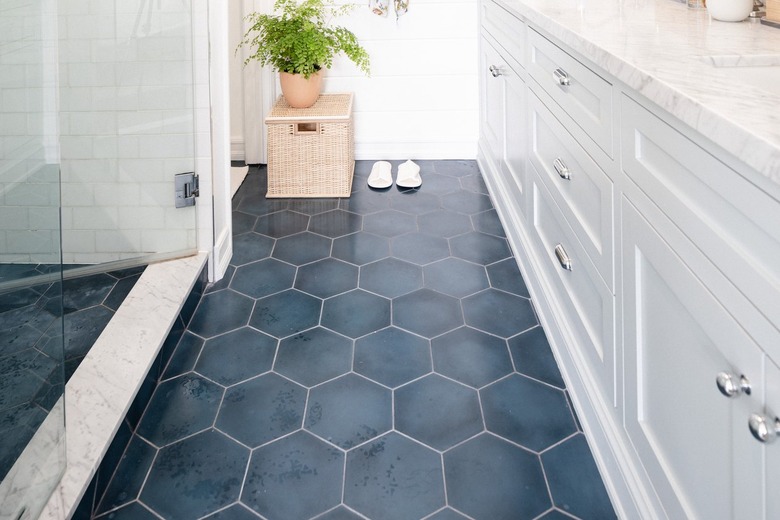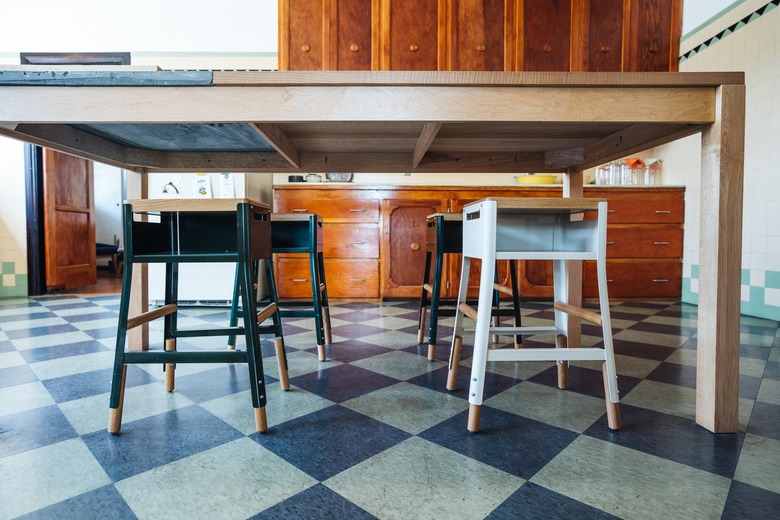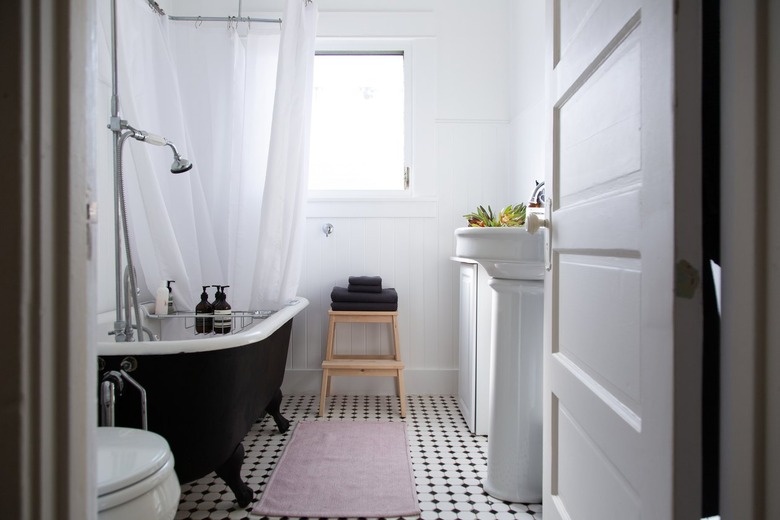How Much Does Tile Installation Cost? (And Tips On How To Hire For The Job)
That worn-out linoleum floor just doesn't vibe with your dreams of a luxury bathroom. Instead, you envision quality tile flooring — perhaps stone of some sort — but have no idea how much to budget for the project. Instead of searching through tile samples at a big-box home improvement store, it's a good idea to research nearby tile suppliers to price out tile you like and then get quotes from a few tile setters who understand the full scope of the project.
Ready to find out how much you should save for your tile installation project? Here are some average costs to guide you — and tips on how to hire the right person to install tile in your home.
Tip
The price range for tile flooring averages $15 to $60 per square foot, including labor.
Tile Installation Cost Factors
The average price for tile installation varies significantly based on a number of factors, such as the square footage, the cost of tiles, and the complexity of the project. Expect to spend between $15 and $60 per square foot on average for the total project cost including materials and labor. For complex projects, such as an outdoor living space, the average cost per square foot could go up by as much as $20. Removing existing flooring or old tile on any tiling project could also add to the total cost, so be sure to ask about that when you are given quotes for the project. Ideally, the installer will break down the cost estimate in writing when offering a quote so that there's no question about the scope of the work and the materials going into the project.
Tile itself averages $3 to $15 per square foot, with some inexpensive ceramic tiles running as little as 50 cents per square foot and the most expensive natural stone tiles sometimes costing upward of $35 per square foot. Porcelain tile tends to run in the middle range at about $3 to $10 for indoor tile. Outdoor tile generally costs more than a similar tile designed for indoor use, as outdoor tile has to withstand the elements. It may even cost double that of its indoor version, but this varies based on the size and makeup of the tile itself. Specialty options, such as a herringbone design, require angled layouts, which means more tile is needed since all the perimeter tiles must be cut at angles.
Labor costs vary greatly on tile installation jobs, and they're often billed per square foot. Expect to pay less per square foot for tile installation on a bathroom floor than for backsplash or countertop installation or any complicated job. Flooring labor averages $6 to $12 per square foot, sometimes a little more or less, while more complex jobs could cost $25 to $35 per square foot. Add about $2 per square foot if the job includes removing old flooring materials and up to $5 per square foot for the work and materials needed to prep the surface for new tile. If your installer quotes by the hour instead of per square foot, expect a wide range from $30 to upward of $100 per hour based on the complexity of the project.
What a Tile Setter Does
A tile setter or installer plans the tile layout to accurately work out patterns (when applicable), calculating the amount of tile needed for the job. They may provide a mockup of the project, especially in instances where the tile layout involves a design, such as on a kitchen backsplash or an intricate flooring pattern. The tile setter also removes the old flooring and readies any subfloor material for tile installation.
This person knows the best materials and best ways to ensure a quality tile job — for instance, when to use uncoupling membrane to prevent cracks in the tile or grout down the road. They're also skilled at grouting and sealing tile and at figuring out the ideal layout to deal with awkward cuts required to work around pipes and similar obstructions. After all, a perfectly square or rectangular project space requiring no tile cutting at all is a rarity.
Doing Your Homework
It's important to put a little effort into figuring out exactly what you want and what it takes to do the job properly before just hiring a tile setter based on a neighbor's recommendation. Figure out the basic type and size of tile you'd like on your project and whether it's a good fit for what you have in mind. For instance, not all tile should be used in a wet environment, such as a shower, and in some cases, the tile suitable for shower walls should not be used on the shower floor. The same holds true for a tiled patio — some tiles can't handle the outdoor temperature extremes of freeze and thaw cycles or of constant exposure to the elements.
Figure out whether your specific tile job requires any special considerations, such as waterproofing sealer, whether cement board is the best backing material for the tile, and if a membrane, such as a dimple mat beneath the tile, is needed to prevent cracking. You may not be able to figure out all the answers on your own, but any questions that remain unresolved are perfect to ask your prospective tile installers.
Why Hire a Tile Setter?
If you're wondering whether to hire a tile setter or DIY the job, consider the full scope and complexity of the project. For instance, if all you're planning to do is add a tile backsplash on a portion of a wall between the kitchen counter and cabinets, this might be simple enough to do yourself, especially if the wall currently has no tile. It's easy enough to figure out a simple tile layout for such an area, and if you use tile sheets that already have a mesh backing on them for layout, it's not hard to determine a pleasing design.
On the other hand, if your project involves removing an old floor or figuring out how to install large format floor tile or a custom tile design in a shower, this is best left to the pros. Ripping out old flooring in and of itself is a major project that often requires lots of physical effort, so let a pro do the hard work and deal with the major mess. Tile installers often have a full crew of people familiar with the work as well. They're efficient in handling the entire scope of the project as well as minimizing messes and dealing with the cleanup. If budget allows, you'll most certainly get a better finished project when hiring a skilled pro for the job.
For projects such as bathroom tiling or kitchen tiling of any kind, it's also good to let the installer do the sealing. An experienced tile setter knows the right kinds of sealants for the grout (and in some cases, the tile) and the room environment, and he knows the right way to apply these products. They'll also be able to tell you how often to reseal the tile should you choose to do that yourself in a few years.
Choosing the Right Tile Setter
Choosing the right tile setter for the job depends on the job itself. For instance, if you're creating an outdoor living area complete with a few kitchen elements, you need a tile setter skilled at installing outdoor tile. Likewise, a tile setter who creates beautiful outdoor tiled patios may not be the best person to install stone tile in your new shower. Consider the nature of your project as well as the full scope and the type of tile you'd like to use to help determine the best tile setter for the job.
An experienced tile setter should have information about their work online, including a gallery of completed work. The right person for the job has a couple years of experience as the head tile setter on completed jobs rather than mostly working as a member of someone else's crew. Their website should mention any special training and certifications the tile setter possesses as well as full information on how to contact her and how to get an estimate. If you can't find any information about the tile setter online, it's probably best to continue your search.
To simplify your search and eliminate the unqualified, visit a site such as that of the Ceramic Tile Education Foundation, which offers a certified tile installer search tool based on ZIP code and type of project. All the tile installers that show up in the search results have completed specific training and follow a code of ethics.
Tile Setter Licensing and Certification
As with other types of contractors, it's best if your tile setter has certifications, such as Certified Tile Installer (CTI) recognition, proving his ability to do a decent job. Any tile setter with CTI certification has worked at least two years as the lead installer on tile projects and has taken an exam to achieve the certification. Many skilled tile setters are members of an organization, such as the National Tile Contractors Association, which offers instructional materials to keep its members up to date on best practices and materials for the field. Your tile setter should also have proof of liability insurance as well as workers' compensation to cover any employees.
References
- Ceramic Tile Education Foundation: A Homeowner's Guide to Finding a Qualified Tile Installer
- Daltile: 5 Things to Do When Hiring a Tile Installer
- Daltile: 6 Mistakes to Avoid for a Waterproof Shower Floor
- HomeAdvisor: How Much Does it Cost to Install Ceramic or Porcelain Tile?
- Stone and Tile Shoppe: Tile Installation Cost
- Ceramic Tile Education Foundation: Find a Certified Tile Installer Near You


